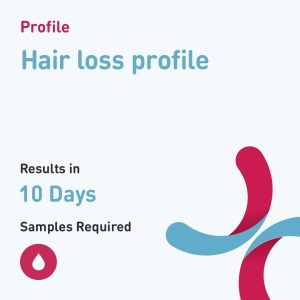Do you suffer sudden hair-loss?
You might be surprised to know that hair loss is a common problem. In fact, about 50% of men will experience some degree of hair loss by the time they reach the age of 50. For women, the number is even higher – about two-thirds will suffer from hair loss at some point in their lives. For some people, hair loss is a temporary condition that resolves itself. If your parents or grandparents experienced hair loss, you may be more likely to suffer from it as well. There are many causes of hair loss, and it can be difficult to determine the underlying cause without proper testing. In this blog post, we will discuss the most common causes of hair loss and blood tests that can help identify the underlying cause.
Other common causes include alopecia (an autoimmune condition that results in hair loss), eczema, dermatitis, and heat treatment of the hair.
What are the common causes of hair loss?
There are many potential causes of hair loss, including:
Hormonal changes
Hormonal imbalances can cause temporary shedding as well as long-term hair loss. Common offenders include thyroid conditions and polycystic ovary syndrome (PCOS). Pregnancy can also trigger hormonal changes that result in hair loss.
Nutritional deficiencies
Eating a diet that lacks essential nutrients can lead to hair loss. A protein deficiency is a common culprit, but deficiencies in other nutrients like iron, zinc, and vitamin D can also cause shedding.
Medications
Hair loss is a common side effect of certain medications, including those used to treat cancer, arthritis, depression, heart problems, and high blood pressure.
Autoimmune disease
Hair loss can be a symptom of autoimmune conditions like alopecia areata (where the body attacks the hair follicles), lupus erythematosus (a chronic autoimmune disorder), and psoriasis (a condition that causes scaling and inflammation).
Infections
Fungal infections like ringworm can cause temporary hair loss, while viral infections like influenza may lead to a condition called diffuse alopecia, which causes widespread shedding.
Stress
Acute or chronic stress can trigger telogen effluvium, a type of temporary shedding characterized by thinning all over the scalp.
What are the treatments for hair loss?
Fortunately, there are treatments available for many types of hair loss. Some of which include;
Minoxidil
This is a topical medication that is applied to the scalp twice daily. It is thought to work by stimulating hair growth and by preventing further hair loss.
Finasteride
This oral medication is taken once daily. It works by reducing the amount of the hormone DHT in the body, which can help to prevent further hair loss.
Hair transplants
In this procedure, healthy hair follicles are taken from another area of the scalp and transplanted into the balding areas. This can help to restore hair growth.
PRP therapy
This treatment involves injecting platelet-rich plasma into the scalp. This can help to stimulate hair growth.
Micro-needling
This is a procedure in which tiny needles are used to create small injuries in the skin of the scalp. This can help to stimulate hair growth.
Laser therapy
This involves using low-level lasers to stimulate hair growth.
Dietary changes
Eating a healthy diet and taking supplements that are thought to be beneficial for hair loss, such as biotin and omega-three fatty acids, may help to prevent further hair loss.
Scalp massage
Gently massaging the scalp with an oil or cream may help to stimulate blood flow and promote hair growth.
If you’re concerned about hair loss, talk to your doctor to discuss possible causes and treatment options.




